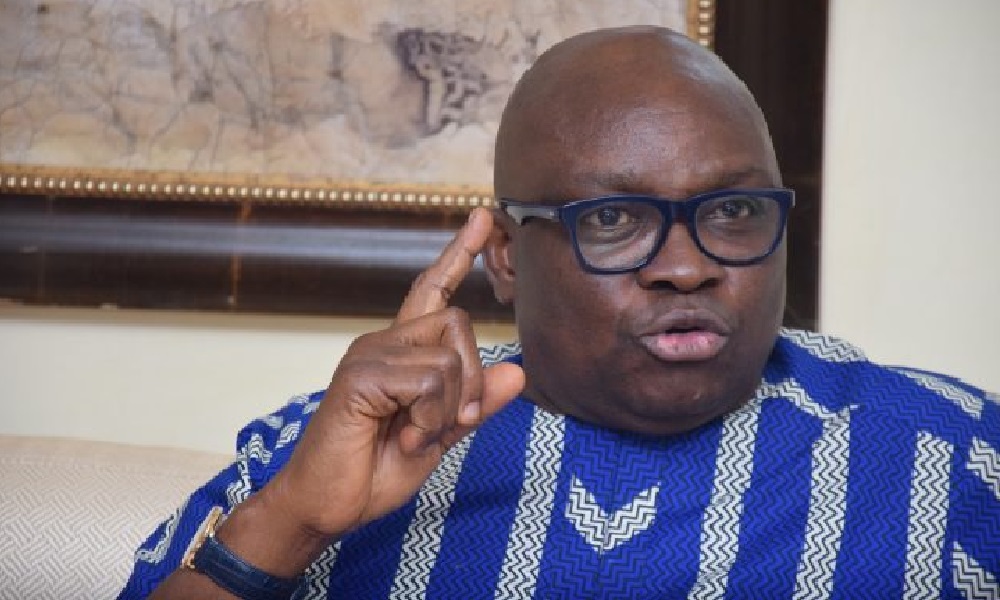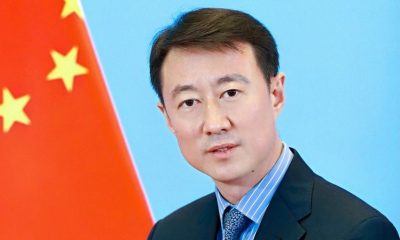News
SAD! Versatile Nigerian movie producer, Dimeji Ajibola, is dead

By Kayode Sanni-Arewa
It was gathered that Ajibola died today after battling an undisclosed illness, leaving a void in the Nigerian film industry.
His colleague, Samuel Olatunji confirmed the sad news to newsmen.
Also mourning his death is fast rising actress, Etta JoMaria who took to X.com to pen an emotional tribute. She wrote: “Just realizing the last moments I spent with Director Dimeji Ajibola were not even captured. While that’s a good thing as we were living in the moment, I’m genuinely sad that I don’t get to have a pictorial representation of how loud our laughs were. Life is short take pictures!
“Director D, you lived a worthy life. A purposeful life. A meaningful life. Grateful to have shared laughs with you, and forever thankful that I was lucky enough to have been directed by you. Rest in Power, King.”
Popular actor, Bolanle Ninalowo while reacting to the movie director’s death wrote: “I love you brother and i will miss you @dimejiajibola. May God heal your family and loved ones. Till we meet again didi vox. Rest on Champ.”
Popular actor, Bolanle Ninalowo while reacting to the movie director’s death wrote: “I love you brother and i will miss you @dimejiajibola. May God heal your family and loved ones. Till we meet again didi vox. Rest on Champ.”
Ajibola was celebrated as a creative force and a visionary in the entertainment industry. His work spanned film, animation, VFX, virtual worlds, and interactive media.
He held a diverse educational background, having studied filmmaking and cinematography at the New York Film Academy in Universal Studios, advanced character animation at Animation Mentor in San Francisco, and visual effects at VFXLearning.
He was the brain behind the 2012 urban musical film, Hoodrush that won multiple awards, including Best Movie at the 2012 Green Me Film Festival in Germany, Best Actor and Soundtrack at the Nollywood Movies Awards, and Best Supporting Actor at the AMAA Awards.
News
In 2027, if Atiku contests again, I will still vote against him-Fayose promises

Ex-governor of Ekiti state, Ayo Fayose, has disclosed that the 2023 presidential candidate under the Peoples Democratic Party, Atiku Abubakar, will not receive his support if he decides to run in 2027.
”I publicly worked against Atiku, and I am saying for the second time, if Atiku comes again, I will work against him.
“It is time to learn our lesson,” Fayose said on Friday during an interview on Channels Television’s Politics Today.
According to the former governor, the crisis in the party reared its head when the decision to zone power to the North was agreed upon by the leaders.
”After eight years of a Northerner, it is the turn of a Southerner. which could involve someone from the East, South West or South South.”
”Those who gave or zoned power back to the North caused all these problems.”
”You don’t have to like a Nyesom Wike or a Peter Obi, but there should be an unwritten, respected gentleman’s understanding of powershift,” he said.
Fayose, back in 2024, openly declared that he publicly worked against Atiku, adding that his decision was for the good of the country
“Don’t get it wrong. I worked against him (Atiku) 100 per cent. Nigeria is bigger than the PDP, APC.”
Fayose, however, conceded that for party supremacy to thrive in the PDP, it needs to show levels of accountability and avoid abuse and breach of zoning agreements.
”The party must be equitable, the party must be accountable. The party or parent that is irresponsible will produce irresponsible children, they will produce rebellion, they will produce anger.”
”After Asiwaju’s(Bola Tinubu) tenure, if God gives him a chance at a second term. Let a Southerner come out, we as leaders at that time, I will be over 70 or about 70, I will come out straight that a Southerner can not be the President of Nigeria.”
News
CBEX: Ponzi scheme promoters face 10 years jail term, N20m fine

The sudden crash of CBEX, a digital investment platform accused of running a Ponzi scheme that allegedly bolted away with over ₦1.3 trillion (about $850) of depositors’ funds, has thrown many Nigerians into a quandary.
CBEX had promised the gullible Nigerians to double their invested funds within a month, but failed to honour its obligations, sending shock waves running through the spine of thousands of Nigerians, who now face financial ruin after the collapse.
The development sparked widespread reactions, with users expressing frustration, criticism, and concern. Many were reported to have stormed the CBEX office in Oyo State to destroy its belongings.
When it started, CBEX claimed to be a global platform linked to a government-owned business in China. However, Beijing Equity Exchange, in a statement released in 2024, denied any affiliation with the Ponzi scheme. It also claimed to operate offices in Canada and has ties with China. These were never substantiated; rather, CBEX displayed certificates online, such as a US FinCEN registration, while no real branches existed outside Nigeria. Business Insider Africa estimates that about 250,000 to 300,000 Nigerians invested their money in CBEX.
This would have raised a red flag for discerning investors to withdraw their patronage, but that did not happen due to greed and get-rich-quick syndrome.
Following its collapse, the Economic and Financial Crimes Commission (EFCC) announced it would collaborate with Interpol to track down the masterminds, including those possibly hiding overseas.
In the aftermath of the sad development, Chief Economist at SPM Professionals, Paul Alaje, has advocated investment education, highlighting that Nigerians have lost an estimated ₦4.8 trillion to pyramid scams since the collapse of MMM in 2016. “Since MMM in 2016, Nigerians have lost approximately 4.8 trillion to pyramid scams. The pyramid scam is a scheme designed to rip you off of funds. It is only a pyramid scam that promises more interest than the IMF and World Bank put together in a month and sometimes in a week,” Alaje said.
Meanwhile, the Securities and Exchange Commission (SEC) clarified that neither CBEX nor its affiliates were granted registration by the Commission at any time to operate as a Digital Assets Exchange, solicit investments from the public, or perform any other function within the Nigerian capital market.
“Preliminary investigations carried out by the Commission have revealed that CBEX engaged in promotional activities to create a false perception of legitimacy, to entice unsuspecting members of the public into investing monies, with the promise of implausibly high guaranteed returns within a short timeframe.
“CBEX has failed to honour withdrawal requests from their subscribers and abruptly closed their physical offices, amid mounting complaints,” the SEC stated.
The SEC emphasised that under the provisions of Section 196 of the Investments and Securities Act 2025, the Commission would collaborate with relevant law enforcement agencies to take appropriate enforcement action against the CBEX, its affiliates, and promoters.
“The Commission uses this medium to remind the public to REFRAIN from investing in or dealing with any entity offering unrealistic returns or employing similar recruitment-based investment models.
“Prospective investors are advised to VERIFY the registration status of investment platforms via the Commission’s dedicated portal: www.sec.gov.ng/cmos before transacting with them”, the SEC added.
SEC Director General, Dr. Emomotimi Agama, had recently said the Commission is launching a more forceful and coordinated enforcement regime against unregistered and illegal “phony” investment schemes, otherwise known as Ponzi schemes. He said that with the newly enacted Investments and Securities Act, 2025 (ISA 2025), the Commission now has enhanced powers to prosecute Ponzi schemes and their promoters.
According to the SEC, investigations were ongoing on CBEX, adding that promoters of the failed scheme will not go scot-free. Agama said the new law has given the Commission more powers and blocked loopholes in emerging areas of virtual and digital assets.
“The ISA 2025 has given the Commission the legal backing to provide clarity, ensure investor protection, and enhance market confidence, especially in new and previously unregulated segments such as digital asset exchanges and online foreign exchange platforms,” Agama said. He said that while the apex capital market regulator would continue to support innovations in finance and investments, the Commission would maintain strict oversight in line with its enhanced investor protection mandate. “We welcome innovation, but it must occur within a regulated environment that protects investors and maintains the integrity of our market,” Agama said.
He recalled that the SEC had even with the limited scope of the repealed Act, maintained extensive surveillance and was able to shut down a number of Ponzi schemes, with some of the promoters, like Fahmzi Interbiz, jailed for defrauding Nigerians. The ISA 2025 gives the Commission more powers to deal with issues, stressing that the Commission will ensure that promoters of such schemes are not allowed to operate.
Indeed, the performance of the Nigerian capital market has been reinvigorated for sustainable growth in line with global best practices. The market has been modernised with a stronger regulatory framework for financial market infrastructures (FMIs), ensuring stability and reducing systemic risks, notwithstanding the global headwinds occasioned by the Donald Trump tariff war.
Indeed, the Nigerian capital market has been enhanced by the Investments and Securities Bill (ISB) 2025, recently assented to by President Ahmed Bola Tinubu. The landmark legislation, which repeals the Investments and Securities Act No. 29 of 2007, has been described as a major boost to capital market regulation in Nigeria. It strengthens the legal framework of the Nigerian capital market, enhances investor protection, and introduces critical reforms to promote market integrity, transparency, and sustainable growth.
The enactment of the ISA 2025 reaffirms the authority of the Securities and Exchange Commission (SEC) as the apex regulatory authority of the Nigerian Capital Market to regulate the market to ensure capital formation, the protection of investors, and the maintenance of a fair, efficient, and transparent market and reduction of systemic risks. It introduces transformative provisions to further align Nigeria’s market operations with international best practice.
Speaking on key highlights of the Act, Director General of the SEC, Dr. Emomoitimi Agama said, “The Act enhances the regulatory powers of the SEC in a manner comparable with benchmark global securities regulators. These enhanced powers and functions ensure full conformity with the requirements of the International Organization of Securities Commissions (IOSCO) Enhanced Multilateral Memorandum of Understanding (EMMoU), enabling the SEC to retain its “Signatory A” status and enhancing the overall attractiveness of the Nigerian capital market.”
One notable aspect of the ISA 2025 is the recognition of digital assets as securities, providing a legal framework for Virtual Asset Service Providers (VASPs) and Digital Asset Exchanges. For the first time, virtual assets and investment contracts are formally classified as securities under Nigerian law. This brings VASPs, Digital Asset Operators (DAOPs), and Digital Asset Exchanges under the SEC’s regulatory purview, providing a clear legal framework for digital assets.
The new Act provides for “Enforcement Against Illegal Investment Schemes”. It expressly prohibits Ponzi Schemes and other unlawful investment schemes, while prescribing stringent jail terms and other sanctions for the promoters of such schemes. To ensure that illegal fund managers are not allowed to fleece unsuspecting Nigerians of their hard-earned funds, the Act stipulates an express prohibition of Ponzi/Pyramid Schemes and other illegal investment schemes. The Act stipulates that promoters and operators of any entity engaged in a prohibited scheme commit an offence and are liable on conviction to a penalty of not less than N20,000,000 or imprisonment for a term of 10 years or both. This is a transformative step for the capital market, reflecting a commitment to building a dynamic, inclusive, and resilient capital market.
Similarly, salient provisions of the Act address existing restrictions in respect of funds raising from the capital market by Sub-Nationals and their agencies to allow for greater flexibility. State and local governments can now raise funds through the capital markets for public projects like infrastructure or healthcare.
This reduces their reliance on federal allocations or debt, fostering economic development at sub-national levels while increasing transparency in fund utilisation.
Furthermore, transparency in securities transactions has gained traction in the market as the Act introduces the mandatory use of Legal Entity Identifiers (LEIs) by participants in capital market transactions. This stipulation is designed to improve transparency in the conduct of securities transactions.
In the same vein, ISA 2025 introduces a stronger regulatory framework for financial market infrastructures (FMIs), such as clearing houses and central depositories, ensuring stability and reducing systemic risks in Nigeria’s capital markets. It creates a legal framework for commodity exchanges and warehouse receipts, allowing for more structured commodity trading and agricultural financing. This is particularly important for Nigeria’s agricultural and mining sectors, which were not well-integrated into the capital market under the ISA 2007. Under the new law, public companies must obtain SEC consent before engaging in mergers, acquisitions, or issuing securities.
The Act mandates that no public company shall undertake schemes, transactions, arrangements, or issue securities related to corporate actions and restructurings without prior approval from the SEC. The idea is to ensure that corporate restructuring activities comply with market regulations and enhance transparency.
Some other provisions of the Act include Comprehensive Insolvency Provisions for Financial Market Infrastructures, which introduce provisions that exempt transactions facilitated through or otherwise involving Financial Market Infrastructures from the application of general insolvency laws.
Management of Systemic Risk – introduces provisions for the monitoring, management and mitigation of systemic risk in the Nigerian capital market. Expansion of the Category of Issuers to the Public – The Act expands the categories of issuers, as a key step towards the introduction of a wide range of innovative products and offerings as well as the facilitation of “commercial and investment business activities”, subject to the approval of the Commission and other controls stipulated in the Act. Classification of Exchanges and inclusion of provisions on Financial Market Infrastructures – The Act classifies Securities Exchanges into Composite and Non-composite Exchanges. A Composite Exchange is one in which all categories of securities and products can be listed and traded, while a Non-composite Exchange focuses on a singular type of security or product. There are also new provisions on Financial Market Infrastructures such as Central Counter Parties, Clearing Houses, and Trade Depositories.
Comprehensive Insolvency Provisions for Financial Market Infrastructures – The Act introduces provisions that exempt transactions facilitated through or otherwise involving Financial Market Infrastructures from the application of general insolvency laws. Management of Systemic Risk – The Act introduces provisions for the monitoring, management and mitigation of systemic risk in the Nigerian capital market. Expansion of the Category of Issuers to the Public- The Act expands the categories of issuers, as a key step towards the introduction of a wide range of innovative products and offerings as well as the facilitation of “commercial and investment business activities”, subject to the approval of the Commission and other controls stipulated in the Act. Strengthening the Investments and Securities Tribunal – The Act amends some key provisions in the repealed ISA 2007 on the Composition of the Tribunal, constitution of the Tribunal, qualification and appointment of the Chief Registrar, as well as the jurisdiction of the Tribunal to enhance the ability of the Tribunal to discharge its mandate optimally.
The capital market expert said the enactment of ISA 2024 is a welcome development that promises to modernize Nigeria’s investment and securities laws, improve regulatory oversight, protect investors, and support emerging financial technologies.
According to Prof Uche Uwaleke, Director of the Institute of Capital Market Studies at the Nasarawa State University Keffi and President of the Capital Market Academics of Nigeria, “For achieving this feat, the National Assembly Committees on the Capital Market, the Securities and Exchange Commission, and indeed the entire Capital Market community in Nigeria deserve a pat on the back.
“It bears repeating that the ISA 2025 ensures a more transparent, efficient, and competitive capital market consistent with global standards set by the IOSCO. This should strengthen investor confidence, enhance market integrity, encourage foreign investment, and ensure that Nigeria retains its “Signatory A” status under IOSCO’s Enhanced Multilateral Memorandum of Understanding (EMMoU).
News
Criminals in military uniform kill 12 at cockfight

Criminals dressed in fake military uniforms opened fire on spectators at a cockfight in rural Ecuador, killing 12 unarmed people and wounding several others, police in the violence-plagued South American nation said Friday.
Security footage of Thursday night’s attack showed a group of at least five men entering the arena and opening fire with automatic rifles on a crowd of dozens in the rural community of La Valencia in northwest Ecuador.
The attackers were dressed in replica military uniforms — a common tactic of criminal gangs in the country, which averaged a killing every hour at the start of the year as cartels vie for control over cocaine routes that pass through Ecuador’s ports.
The footage, circulated on social media, showed spectators flinging themselves to the ground and taking cover under their seats.
“We have 12 people deceased as a result of an armed attack by a criminal group,” police colonel Renan Miller Rivera said in a statement Friday.
He said several people were injured, without giving a number.
Police have detained four people, including a “target of intermediate value,” national police chief Victor Hugo Zarate wrote on the X social platform.
After the attack, police found discarded “military-style uniforms” and two abandoned cars on a nearby highway, Miller Rivera added. One of the cars had been set on fire, the other had overturned.
Ecuador is home to around 20 criminal gangs involved in trafficking, kidnapping and extortion. They have wreaked havoc in the country of 18 million squeezed between the world’s biggest cocaine producers, Peru and Colombia.
In recent years, the nation has been plunged into violence by the rapid spread of transnational cartels that use its ports to ship drugs to the United States and Europe.
-

 News19 hours ago
News19 hours agoJust in: Many Feared Killed In Abuja
-

 News22 hours ago
News22 hours agoSenator Natasha on FB listed 3 politicians that should be arrested if anything happens to her
-

 News23 hours ago
News23 hours agoEmergency Rule: We should be thankful to President Tinubu -Wike
-

 News21 hours ago
News21 hours agoChina Reaffirms One-China Principle, Commend Support From Nigeria
-

 News18 hours ago
News18 hours agoPolice clarify on report alleging First Lady’s convoy killed 7-yr-old baby
-

 News17 hours ago
News17 hours agoAbuja raid attack: Three NDLEA officers sustain gunshot injuries, hospitalized
-

 News18 hours ago
News18 hours agoEaster: HoR Minority Caucus celebrates with Christians, urges love, peace, national cohesion, calls for end to killings nationwide
-

 News17 hours ago
News17 hours agoTinubu preaches hope at Easter gives directive to military to end insecurity






